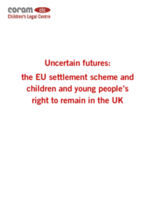Summary
There are an estimated 727,000 EU national children under the age of 18 living in the UK and an additional 239,000 UK-born children of EU national parents. Children represent 32% of the estimated 3.8 million individuals who may have to engage with the EU settlement scheme, a new process designed for European nationals and their family members to demonstrate their right to remain in the UK before the end of the Brexit transition period (which will be 31 June 2021 or 31 December 2020 depending on whether the UK leaves the EU with a deal or not). The government has confirmed that in the event of a ‘no deal’ scenario, the EU settlement scheme will still run and the basis for qualifying will remain the same. Under the scheme, individuals will be granted ‘settled status’ if they can demonstrate their nationality and that they have been resident in the UK for five years (subject to criminality checks). Those who cannot demonstrate five years residence will be granted ‘presettled status’ with the option to subsequently apply for settled status.
This is the largest-scale registration programme the UK has ever seen and presents a huge challenge for the Home Office. If the scheme does not function effectively and/or individuals do not apply to it, there is the risk that hundreds of thousands of children and young people will find themselves ‘undocumented’, without legal status after the relevant period. They will then be subject to policies that were introduced under the government’s ‘hostile environment’ agenda, and will be unable to work, to drive, or to open a bank account, and will be effectively barred from college, university and secondary healthcare.
For over 18 months, Coram Children’s Legal Centre (CCLC) has raised concerns with government about the potential obstacles that many European national children and families will need to overcome in order to gain status through the settlement scheme. During that time, we have welcomed the government’s acknowledgement of the challenges facing particular vulnerable groups, including children in care and care leavers, and concessions such as the announcement in January that no fee would be charged to those applying under the scheme.
However, a number of our concerns remain. In November and December 2018, CCLC was one of the organisations involved in the Private Beta stage of the settlement scheme pilot, through which we supported 72 European nationals and their national family members to apply for status through the scheme. The average application took between one and a half to two hours to complete. At the more extreme end, where there were documentary or technical problems, applications took up to 10 hours to complete, and required legal advice, technical support and practical assistance with gathering evidence. CCLC advised an additional 30 to 40 people who then did not make an application: because they were too vulnerable, because there were insurmountable documentary issues within the scope of the pilot or because they had an alternate route, such as making a permanent residence application or making a nationality application, which was in their best interests.
Based on our legal knowledge and experience during Private Beta 2, CCLC considers the following children to be particularly at risk:
• Children, young people and families with complex cases, including those who are separated from their family and cases where, for example, eligibility is unclear for non-European family members, where there has been domestic violence or where the applicant had a criminal record. These individuals will need support to ascertain whether it is appropriate to make an application (they may, for example, have existing rights to British nationality) and/or to complete their applications. This will be work that is regulated by the Office of the Immigration Services Commissioner (OISC), and there is currently no long term statutory funding (i.e. legal aid) to provide this support.
• Children who are unable to prove their nationality or length of residence in the UK. Children in care, for example, may struggle to obtain proof of their length of residence or may require parental consent to obtain nationality documents. Where children are dependent on rights derived from their parents to make an application, then they may be placed at risk where there is domestic abuse or exploitation.
• Children with an existing claim to automatic acquisition of British citizenship or a case to register at discretion whose rights and entitlements may be time-limited or hard to evidence.
• Children in care who are only granted pre-settled status and subsequently leave care, who risk falling out of status and becoming subject to the hostile environment
Children and young people face a number of barriers to settlement, some of which are the result of policy decisions made by the Home Office in designing the scheme, and others which are pre-existing practical obstacles. A lack of legal advice and assistance is likely to exacerbate these problems, and we are concerned about potential for poor decision-making and the absence of a right of appeal in the event of the UK leaving the EU without a withdrawal agreement. This report outlines the barriers to settlement demonstrated by the work CCLC has done with children and young people and makes recommendations for the ways in which the government can ensure that these barriers can be overcome as the EU settlement scheme is rolled out.

